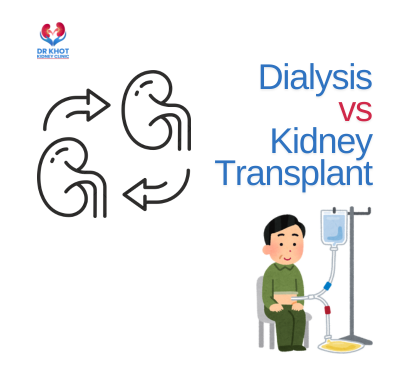When kidneys can no longer filter waste effectively due to chronic kidney disease (CKD) or kidney failure, patients face a life-changing decision: dialysis or a kidney transplant. Both treatments can sustain life, but they differ in procedure, lifestyle impact, risks, and long-term benefits.
This article breaks down the differences, helping you make an informed choice with your doctor.
Understanding the Basics
1. What Is Dialysis?
Dialysis is an artificial process of filtering waste, salt, and excess fluid from the blood when the kidneys can’t perform these functions naturally.
There are two main types:
- Hemodialysis (HD) – Blood is filtered through a dialysis machine outside the body, usually done 3 times a week at a clinic or hospital.
- Peritoneal Dialysis (PD) – Uses the lining of your abdomen (peritoneum) and a special fluid to filter blood inside the body, usually done at home.
2. What Is a Kidney Transplant?
A kidney transplant replaces a failing kidney with a healthy one from a living or deceased donor. The new kidney takes over the work of filtering blood, ideally offering better quality of life and independence compared to dialysis.
Comparing Dialysis and Kidney Transplant
| Factor | Dialysis | Kidney Transplant |
| Procedure | Ongoing treatment (several times a week for life unless transplanted) | One-time surgery with lifelong follow-up |
| Survival Rate | Effective for years but may shorten life expectancy compared to transplant | Generally offers longer survival if successful |
| Lifestyle Impact | Time-consuming, dietary and fluid restrictions | More freedom with diet and activities after recovery |
| Risks | Infection, low blood pressure, fatigue | Surgery risks, organ rejection, side effects of anti-rejection drugs |
| Availability | Widely available immediately | Requires donor match and waiting time |
| Cost | Ongoing costs for each session | Higher upfront cost but often cheaper in long term |
Pros and Cons of Dialysis
Pros:
- Available immediately—no waiting for a donor
- Can be done at home (peritoneal dialysis) or clinic
- No major surgery required
Cons:
- Time-consuming and restrictive
- Higher long-term costs
- Possible side effects: fatigue, cramps, low blood pressure
Pros and Cons of Kidney Transplant
Pros:
- Better quality of life and freedom
- Improved life expectancy compared to dialysis
- More energy and fewer dietary restrictions
Cons:
- Requires major surgery
- Lifelong medication to prevent rejection
- Risk of infection and other complications
Which Option Is Right for You?
The decision depends on:
- Overall health – Not all patients are fit for surgery.
- Availability of a donor – Transplants require a compatible match.
- Lifestyle goals – Some prefer the independence of a transplant, others the flexibility of home dialysis.
- Medical advice – Always consult your nephrologist for a personalized recommendation.
Both dialysis and kidney transplants save lives, but a transplant generally offers a better quality of life and longer survival—if it’s a safe option for you. Dialysis remains a crucial lifeline for those waiting for or not eligible for a transplant.

